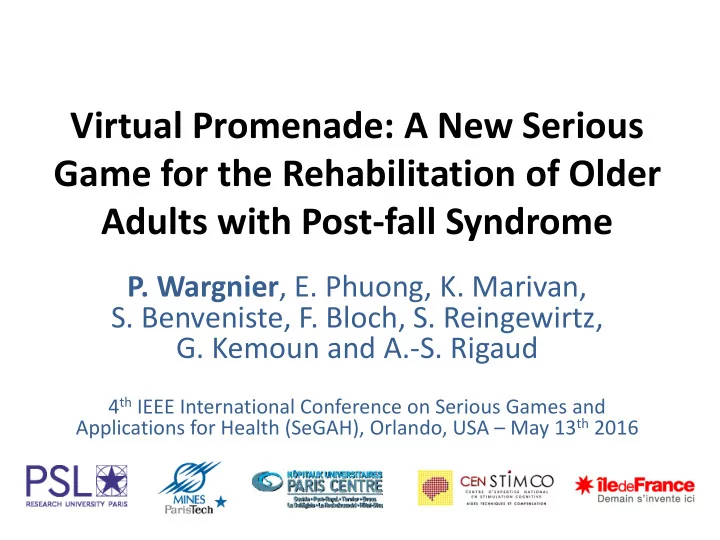

Virtual Promenade: A New Serious Game for the Rehabilitation of Older Adults with Post-fall Syndrome P. Wargnier , E. Phuong, K. Marivan, S. Benveniste, F. Bloch, S. Reingewirtz, G. Kemoun and A.-S. Rigaud 4 th IEEE International Conference on Serious Games and Applications for Health (SeGAH), Orlando, USA – May 13 th 2016
Motivations • 35% of people in developed countries will be over 60 by 2050 • Falls cause many deaths and disabilities in older adults • 35 to 40% of older adults over 65 fall at least once a year • 10% of fallers get seriously injured • Psychological consequences are often neglected in care practices 2016-05-13 2
Outline 1. Motivations 2. Post-fall syndrome 3. Living lab participatory design 4. System description 5. Preliminary study 6. Designing the VP game 7. Conclusion, latest evolutions and future work 2016-05-13 3
Post-fall Syndrome (PFS) • Psychological and psychomotor consequences of falls: o Fear of falling o Psychomotor disadaptation syndrome • PFS resembles post-traumatic stress disorder (PTSD) • Virtual reality has proved useful in treating PTSD and phobias Can virtual reality help treat PFS? 2016-05-13 4
Living-lab participatory design • Iterative design cycle • Basic principles: o Openness o Influence o Reality o Value creation o Sustainability • Fast prototyping Figure 1 – Living lab design cycle 2016-05-13 5
System description (1/2) • System features: o Repurposed chair with moving seat by Backwell (Israël) o Virtual strolling game • Game development in Unity using ready-for-use graphical assets for fast iterations Figure 2 – The Virtual Promenade system 2016-05-13 6
System description (2/2) Figure 4 – Screenshot of the game Figure 3 – Virtual Promenade system setup Figure 5 – Game controllers used in the study 2016-05-13 7
Preliminary study • Goal: Assess feasibility and check for safety and acceptance • Participants: o 4 males, 4 females o 81 < age < 94 (mean = 87.4) o Mean MMSE score = 25.8 o Moderate or severe gait disorder o 5 with fear of falling • Tried moving chair and virtual reality separately Figure 6 – The game used in the • Results: no pain; no nausea; positive preliminary study feedback; no obstacles to deployment 2016-05-13 8
Serious game participatory design • Start with one environment, one avatar and one controller • Participants: 8 women over 80 (1 with PFS) • Evolutions through testing: Issue Response City environment is unwelcoming Added forest and park environments Players did not identify with the avatar Added 7 extra character models Flight simulator joystick is too stiff Added support for other game controllers Older adults need time to familiarize with Added tutorials explaining how to play the controls and give players time to adapt Players keep moving their avatar when Freeze the avatar when they are supposed to read instructions instruction text is on 2016-05-13 9
Visuals from the game Figure 7 – Top left: city; top right: forest; bottom left: tutorial; bottom right: characters’ faces renderings 2016-05-13 10
Game contents after iterations • Tutorial level explaining how to control the avatar and the game mechanics of path following through cube collection • Free strolling in the forest environment • Cube collection task in the park environment • City level still available with cube collection task 2016-05-13 11
Conclusions • Novel method to tackle PFS through virtual reality exposure • Well-tolerated and deployable in hospital environment • Players enjoyed the experience • Virtual environments’ aesthetics are important to older adults • No perfect fit for the game controller 2016-05-13 12
Latest evolutions • Spotting other design issues: o Playtesting session with 9 older adults o Focus group with physiotherapists o Focus group with psychomotricians o Physicians’ requirements o Testing with 6 hospitalized older adults with cognitive impairment and PFS • Changes made: o Added a level with single directional axis control o Flattened path in forest environment o Split tutorial in three parts (one before each level) o Added “easy” mode for people with cognitive impairment 2016-05-13 13
Future work • Prototype validation study (ongoing) • Randomized controlled study to assess PFS treatment efficacy and long-term benefit • Explore other interaction modalities • Enrich game mechanics with other activities, NPCs (pedestrians) and moving objects (cars) • Include a virtual coach/therapist? 2016-05-13 14
Demo video Available at https://youtu.be/5kFZ2z3d7rs 2016-05-13 15
Virtual Promenade: A New Serious Game for the Rehabilitation of Older Adults with Post-fall Syndrome P. Wargnier , E. Phuong, K. Marivan, S. Benveniste, F. Bloch, S. Reingewirtz, G. Kemoun and A.-S. Rigaud 4 th IEEE International Conference on Serious Games and Applications for Health (SeGAH), Orlando, USA – May 13 th 2016
Recommend
More recommend